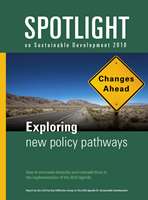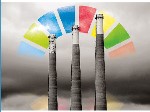Social Watch News
|
Source: . Published on Wed, 2019-05-08 09:13
La desigualdad impide la implementación de los 17 Objetivos de Desarrollo Sostenible (ODS) en América Latina. Un evento en Bonn, Alemania, reunió a expertos de más de 150 países que presentaron los últimos avances. |
Published on Tue, 2019-05-07 20:26
The 2030 Agenda represents a paradigm shift in terms of universality and interlinked goals, including across borders and affirms the need for a rights-based approach to peace and security, one focused on prevention. At the same time, most governments are still producing, trading and spending more on arms, thereby fueling a militarized approach to peace and security. Dominant power talks on how to achieve peace continue to silence those impacted most by conflicts and wars, including women and children. Profits made under war economies and through the arms trade continue to deepen inequalities and violate the rights of those with enormous humanitarian and development needs. |
|
Published on Fri, 2019-04-12 09:46
» |
Published on Fri, 2019-04-12 09:30
From Puerto Rico, the women's organization Cohitre also describes a “colonial condition that imposes agendas foreign to our people”. In September 2017 hurricanes Irma and Maria hit the island, destroying 70,000 homes and collapsing its electric network (still not completely restored), its transport system, hospitals and fuel and food supplies. The catastrophic effects are sharpened by the absence of political powers -the island is a US 'unincorporated territory' since 1898- and the control of its finances by a US-imposed Fiscal Control Board, due to its indebtedness. “The diversion of funds to pay off public debt, adjustment plans, austerity measures, the reduction of the public sector and privatization has compromised the government's capacity to respond to the crisis” while “the response of the US government is slow, erratic and centralized” and “the US Congress has shown no rush to provide aid to Puerto Rico, given the debate over corruption and how to manage the funds”. |
Published on Fri, 2019-04-12 09:27
The Government of India presented its first Voluntary National Review (VNR) report on Implementation of the Sustainable Development Goals (SDGs) to United Nations in 2017. Despite VNR guidelines urging countries to inform on “progress and status of all SDGs”, India reported on only seven goals. This is surprising as India’s VNR claimed its national development goals are “mirrored in the SDGs” and as Government had asserted 11 of 17 SDGs were already being worked on even before the SDGs were adopted. Given the consensus that SDGs’ success largely depends on India’s achieving them, an appraisal of its performance in critical social sectors, including those associated with the SDGs left out of VNR, becomes necessary. |
Published on Wed, 2019-04-10 10:55
The Economic and Social Council (ECOSOC) Partnership Forum will hold its annual session at UN headquarters on 11 April 2019. This year it will focus on partnership efforts supporting the 2030 Agenda for Sustainable Development and its Sustainable Development Goals (SDGs). The 2030 Agenda is the subject of review by the High-Level Political Forum on Sustainable Development (HLPF) annually under ECOSOC and at summit level every four years (including 2019) under the auspices of the UN’s highest political body, the General Assembly. |
Published on Wed, 2019-04-10 00:00
Promoting the Decent Work Agenda (DWA) remains the main objective of the trade union input into the 2030 Agenda. Based on rights and democratic ownership, the DWA is the foundation for sustainable development, as opposed to palliative interventions. Human and labour rights, freedom of association and collective bargaining and social dialogue are not only essential ingredients for sustainable economic growth but are the pillars of democracy-building. Building and fortifying democratic processes is in turn the cornerstone of just development. |
Published on Wed, 2019-04-10 00:00
Promoting the Decent Work Agenda (DWA) remains the main objective of the trade union input into the 2030 Agenda. Based on rights and democratic ownership, the DWA is the foundation for sustainable development, as opposed to palliative interventions. Human and labour rights, freedom of association and collective bargaining and social dialogue are not only essential ingredients for sustainable economic growth but are the pillars of democracy-building. Building and fortifying democratic processes is in turn the cornerstone of just development. |
| Published on Tue, 2019-04-02 09:08 |
Published on Tue, 2019-04-02 08:57
Governments have dedicated a pivotal role to the private sector in the implementation and financing of the 2030 Agenda and the SDGs. This has pushed a turn towards the private sector, the promotion of multi-stakeholder partnerships between public and private actors. However, far too often there is a considerable gap between the social and environmental commitments companies make publicly in political fora like the UN and the actual effects of their production patterns and investment strategies on people and the environment. |
SUSCRIBE TO OUR NEWSLETTER








